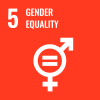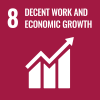Southern Bangladesh, 10 April 2023 – “It was quite challenging for me to move on after my husband died,” says Ruma, a 38-year-old widowed single mother from a small town in southern Bangladesh.
“I experienced social harassment. I also needed money to pay for my child’s education, so I decided to migrate to earn money.”
Married at an early age, Ruma had to discontinue her studies. She had been married for only two years and pregnant with their first child when her husband was killed during a violent family brawl. Her son was born in August 1999, fatherless. Ruma vowed never to marry again and to dedicate her life to raising her son.

With help from a design shop, Ruma has merged photos of her and her husband. She still loves him so much. Photo: IOM 2022
However, in 2014, Ruma felt she had run out of possibilities. Shunned by the community and with few options to provide for her son Rabiul and herself, she hoped for a new life abroad. A cousin who offered to facilitate the travel asked for BDT 800,000 (USD 7,600) in exchange for getting her to Italy.
“I didn’t want to go to countries in the Middle East because Europe is generally considered safer for women. As a single mother, I couldn’t take any risks. So, I paid her in full, selling all my jewelry and using all my savings,” Ruma recalled.

Ruma Begum shows cloth to customers at her factory. Photo: IOM 2022
After making several tough decisions, Ruma eventually made it to Milan, Italy, through a marriage of convenience, which did not last long. Left with little choice, Ruma finally got out of the arranged marriage, forcing her to escape from Milan before eventually making it to Naples, where she landed a job at a garment factory run by a Bangladeshi national.
Although she quickly learned sewing skills and some tailoring techniques, working there became increasingly difficult as she did not have a valid work permit. After six months, she was forced to return to Milan, where she became destitute without any support and decided to return to Bangladesh.

Ruma Begum happily manages her business in a rural community of Bangladesh. Photo: IOM 2022
She returned home in December 2019 after having used up all her savings. Her son had graduated from high school and worked at a medical facility in Dhaka.
Ruma continued to dream of a better future for her son. Despite being devastated by what had happened to her, she was determined to start again.

Ruma Begum also has invested in a local jewelry and cosmetic shop. She also sometimes operates the business by selling products. Photo: IOM 2022
She took a job at a tailoring shop for a meager pay of BDT 4,000 (USD 37). The one positive outcome from her time in Italy was that she could apply the tailoring skills she had learned in Naples and soon became popular among local customers.
While struggling with living costs, she learned about the Sustainable Reintegration and Improved Migration Governance (Prottasha) project. The Prottasha team provided her with financial literacy training, followed by in-kind support in 2020.
Together with a cousin, she set up a tailoring shop using the fabric she had received from the project. As a single mother and a woman living independently, she was initially not well received by her community. In fact, other store owners frowned upon her.

Ruma Begum looks forward to establishing a big garment factory and expanding her business. Photo: IOM 2022
However, Ruma was defiant. “I now run my own business, and my shop is the most popular in this market. I have sent my son to Saudi Arabia, where he is doing well. With the money I earn, I live as I please,” she said, browsing through the pictures she took during her latest trip to Cox’s Bazar.
Ruma certainly defied the odds and achieved success through blood, sweat, and sacrifice.
Funded by the European Union, the Prottasha project contributed to the sustainable reintegration of returnees in Bangladesh and the progressive achievement of Sustainable Development Goal 10.7 to facilitate orderly, safe, regular, and responsible migration and mobility of people, including through the implementation of planned and well-managed policies.
By Md Sariful Islam, National Communications Officer, IOM Bangladesh



